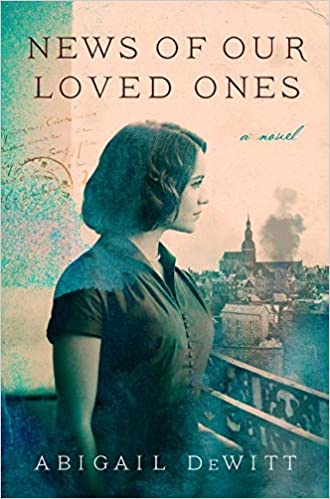News of Our Loved Ones by Abigail DeWitt
The top critical Amazon review of my last novel, Dogs, laments that “there was unnecessary use of the ‘F’ word.” The novel is from the point of view of a pot-smoking, shoplifting teenager in the 1970s. What did the reader expect? I laughed and figured I was in good stylistic company: I’d once heard Junot Diaz criticized on NPR for his “language,” and the radio host wasn’t talking about the rhythm of his sentences.
In fairness to my Amazon critic, it isn’t only when I’m inside the mind of a fictional character that I’m drawn to profanity. I’ve loved swearing since I was a little girl. My father, who taught me to love good writing, swore like the Navy veteran he was and, from Chaucer to Kendrick Lamar, anyone with an ear knows there’s just no substitute for certain words.
But my newest novel, News of Our Loved Ones, which is told from multiple points of view, many of them middle-class French women born in the early 1900s, contains very little profanity. And when I’m teaching fiction, I don’t swear at all. The beauty of profanity is that it leaps out of us; it’s a reaction, as raw and immediate as a yelp or a flood of tears, but to survive in the world—for the world to survive us—we have to be able to moderate our reactions.
 You could argue that Donald Trump has done worse things than debase language, but it’s all of a piece. Every time he speaks crudely, he’s saying that the office of the president is a joke, that he doesn’t have to make any more effort than anyone else, that his mood is all that matters. And every time we respond by swearing at him or his administration, we legitimize Trump’s voice. I adore Samantha Bee, I often think like Kathy Griffin, I could have been that woman on her bicycle, giving the presidential motorcade the finger, and my heart was with the audience cheering on De Niro. But I also know that swearing publicly about Trump’s administration is a way of saying to him: yeah, let’s talk this way, let’s strip down and wrestle in the mud, show me what you got. There’s a kind of relief in it, but relief isn’t what we need now.
You could argue that Donald Trump has done worse things than debase language, but it’s all of a piece. Every time he speaks crudely, he’s saying that the office of the president is a joke, that he doesn’t have to make any more effort than anyone else, that his mood is all that matters. And every time we respond by swearing at him or his administration, we legitimize Trump’s voice. I adore Samantha Bee, I often think like Kathy Griffin, I could have been that woman on her bicycle, giving the presidential motorcade the finger, and my heart was with the audience cheering on De Niro. But I also know that swearing publicly about Trump’s administration is a way of saying to him: yeah, let’s talk this way, let’s strip down and wrestle in the mud, show me what you got. There’s a kind of relief in it, but relief isn’t what we need now.
For 30 years, I’ve encouraged writing students to hold nothing back from the page: Say the unsayable, what’s impolite, all of it. Write streams of profanity to loosen yourself up. I go on: Nothing shocks me, I promise you. You can show me those early drafts and I’ll help you revise them into art. Revision, of course, is the key, and it goes well beyond correcting and polishing a piece of prose. It means re-envisioning our material, looking beyond the initial thoughts and feelings that led us to put something down on paper. Donald Trump, we’re told, says “what other people think.” But revision—knowing what to discard and what to explore more deeply—makes the difference between a self-indulgent rant and something that can be useful for others. It’s the difference between exposing what’s hidden and illuminating it. Illumination allows us to understand something, to see it in all its complexity. When we expose something, we’re just offering a peep show, reducing the human experience to a trivial titillation.
I don’t want to mud-wrestle Trump. He’s undefeatable in the pit, but even if he weren’t, it seems to me that the most revolutionary thing art can do right now is to illuminate whatever tender, aching truth lies beneath the current ugliness and crassness. Who are we beneath the rage and the fear? If we can remember that, we may yet reclaim our dignity—our decency, even.
After a while, God willing, the dignity might become a little staid. Then artists can go back to swearing.
Abigail DeWitt’s third novel, News of Our Loved Ones, will be published by Harper in October 2018.





